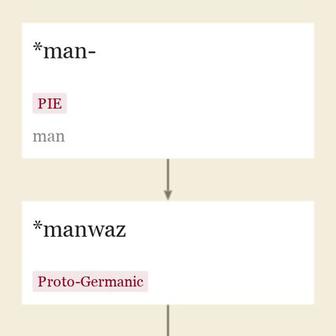foreman (n.)
early 13c., "a leader," from fore- + man (n.). From 1530s as "principal juror;" 1570s in the sense of "principal workman." Similar formation in Dutch voorman, German Vormann, Danish formand. Also in 17c., a slang word for "penis." Fem. form forewoman is from 1709, originally of a jury; forelady is from 1867 in reference to juries, 1888 of shops, American English.
Entries linking to foreman
"a featherless plantigrade biped mammal of the genus Homo" [Century Dictionary], Old English man, mann "human being, person (male or female); brave man, hero;" also "servant, vassal, adult male considered as under the control of another person," from Proto-Germanic *mann- (source also of Old Saxon, Swedish, Dutch, Old High German man, Old Frisian mon, German Mann, Old Norse maðr, Danish mand, Gothic manna "man"), from PIE root *man- (1) "man." For the plural, see men.
Sometimes connected to root *men- (1) "to think," which would make the ground sense of man "one who has intelligence," but not all linguists accept this. Liberman, for instance, writes, "Most probably man 'human being' is a secularized divine name" from Mannus [Tacitus, "Germania," chap. 2], "believed to be the progenitor of the human race."
Specific sense of "adult male of the human race" (distinguished from a woman or boy) is by late Old English (c. 1000); Old English used wer and wif to distinguish the sexes, but wer began to disappear late 13c. and was replaced by man. Universal sense of the word remains in mankind and manslaughter. Similarly, Latin had homo "human being" and vir "adult male human being," but they merged in Vulgar Latin, with homo extended to both senses. A like evolution took place in Slavic languages, and in some of them the word has narrowed to mean "husband." PIE had two other "man" roots: *uiHro "freeman" (source of Sanskrit vira-, Lithuanian vyras, Latin vir, Old Irish fer, Gothic wair; see *wi-ro-) and *hner "man," a title more of honor than *uiHro (source of Sanskrit nar-, Armenian ayr, Welsh ner, Greek anēr; see *ner- (2)).
Man also was in Old English as an indefinite pronoun, "one, people, they." It was used generically for "the human race, mankind" by c. 1200. As a word of familiar address, originally often implying impatience, c.1400; hence probably its use as an interjection of surprise or emphasis, since Middle English but especially popular from early 20c.
As "a woman's lover," by mid-14c. As "adult male possessing manly qualities in an eminent degree," from 14c. Man's man, one whose qualities are appreciated by other men, is by 1873. Colloquial use of the Man for "the boss" is by 1918. To be man or mouse "be brave or be timid" is from 1540s. Meaning "piece with which a game (especially chess) is played" is from c. 1400.
Man-about-town "man of the leisure class who frequents clubs, theaters, and other social resorts" is from 1734. Man of the world is from mid-14c. as "secular man, layman;" by early 15c. as "man experienced in the ways of the world, one able to take things in stride." To do something as one man "unanimously" is from late 14c.
So I am as he that seythe, 'Come hyddr John, my man.' [1473]
MANTRAP, a woman's commodity. [Grose, "Dictionary of the Vulgar Tongue," London, 1785]
At the kinges court, my brother, Ech man for himself. [Chaucer, "Knight's Tale," c. 1386]
Trends of foreman
More to Explore
updated on September 28, 2017
Trending words
Dictionary entries near foreman
foreign
foreigner
foreknowledge
foreleg
forelock
foreman
foremast
fore-mentioned
foremost
forename
forenoon

